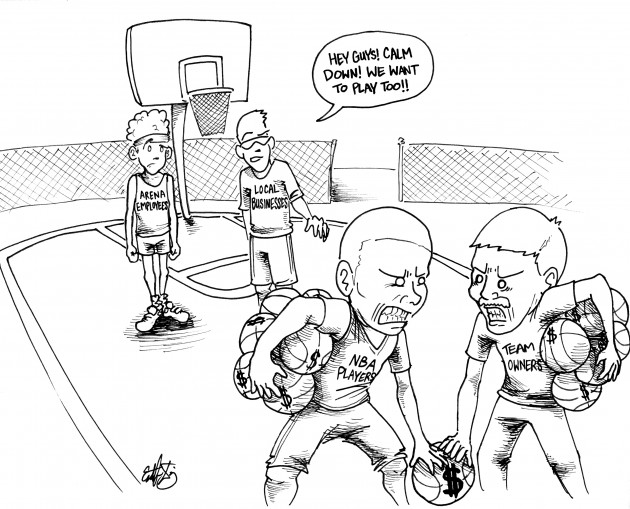
People across the country have had money and jobs snatched away from them within the last week, and there’s nothing they can do about it.
Unfortunately, the money they thought they’d be making will only return when millionaires and billionaires can settle their differences and reach an agreement.
The National Basketball Association’s season should have been in full swing since opening night was scheduled last Tuesday. But all games since then, and at least the first two weeks of the season, have been canceled because of a lockout.
In a lockout, the owners of the 30 league teams can’t agree on how to share the league’s revenue with the players. The previous contract between the two sides, called a collective bargaining agreement, ended this year and gave players 57 percent of the NBA’s revenue and owners 43 percent.
The owners want a bigger share in the new collective bargaining agreement, a share the players are not willing to concede.
While the two sides argue back and forth over the NBA’s revenue, everyday people have begun to make headlines. They are the people that lose more from the lockout than the players, owners or fans. They lose a part of their livelihood.
Those people have voiced their dismay to media outlets in every part of the country.
A waitresses in Detroit told the Detroit Free Press, “That’s the reason we all work here, for Pistons games. During Pistons season we make great money.”
Another restaurant owner in Milwaukee told online magazine OnMilwaukee.com, “It will affect our gross revenues by about 25 percent every week. That’s a huge hit. You basically don’t end up with a bottom line.”
The NBA owes it to arena workers and local business owners to reach an agreement, and these people have the right to blame the league for their losses.
There are arguments to be made for both the owners and players as they fight over revenue.
The owners say the league’s net losses of $650 million over the last two seasons have forced them to demand more of the revenue.
But in most businesses, the CEO of a company can’t demand 5 percent more of the revenue from his or her employees without serious repercussions.
The NBA players, though, can’t just find another company to work for.
And while the league might be profitable if its top players stopped earning enormous amounts like the Los Angeles Lakers’ Kobe Bryant ($24.8 million in 2010-11), some owners like the Dallas Mavericks’ Mark Cuban (net worth $2.5 billion) could pocket less revenue and still make a bountiful living.
In the end, both sides might realize they must give a little if they want their livelihoods to exist at all.
On Sunday, the owners essentially gave the players an ultimatum: agree to a 51 percent share of the NBA’s revenue by Wednesday or have that amount lowered to 47 percent thereafter. The players rejected that offer.
We aren’t rooting for either the owners or the players. What we’re concerned about is the money neither side is talking about – the money currently not in the pockets of business owners and minimum wage employees.



